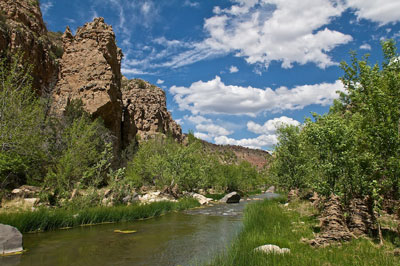Upper Verde Wild and Scenic River
The Wild and Scenic Rivers Act of 1968 was enacted by the U.S. Congress to preserve certain rivers with outstanding natural, cultural, and recreational values in a free-flowing condition for the enjoyment of present and future generations.
 “It is hereby declared to be the policy of the United States that certain selected rivers of the Nation which, with their immediate environments, possess outstandingly remarkable scenic, recreational, geologic, fish and wildlife, historic, cultural or other similar values, shall be preserved in free-flowing condition, and that they and their immediate environments shall be protected for the benefit and enjoyment of present and future generations.”
“It is hereby declared to be the policy of the United States that certain selected rivers of the Nation which, with their immediate environments, possess outstandingly remarkable scenic, recreational, geologic, fish and wildlife, historic, cultural or other similar values, shall be preserved in free-flowing condition, and that they and their immediate environments shall be protected for the benefit and enjoyment of present and future generations.”
The upper Verde River is an extremely strong candidate for Wild and Scenic River status. In 2011, a coalition of Arizona conservation groups and concerned citizens released “A Citizens’ Proposal for the Upper Verde Wild and Scenic River.” See the Executive Summary. The full proposal on DVD is available upon request.
The proposal is on hold until a local congressional representative agrees to introduce legislation to the US Congress.
Recommendations for designation were based on a systematic evaluation of natural and cultural values along the river segments and adjacent lands as prescribed in the Wild and Scenic Rivers Act. The criteria for determining eligibility were the free flowing character of the river segments and the presence of one or more Outstandingly Remarkable Values (ORVs) including scenery, geology, fish, wildlife, historic and cultural, recreation, and other values. The analysis shows that 44.5 miles of the upper Verde River, plus 1.6 miles of lower Granite Creek and 4.0 miles of Sycamore Creek are eligible for inclusion in the NWSRS. Every segment in the study area qualifies with seven ORVs.
How WSRA designation protects the river:
• Recognizes the upper Verde River as a national treasure.
• Prevents new federal water projects, diversion, and mining.
• Maintains the free-flowing character of the river within the WSR boundary.
• Protects water quality.
• Supports and respects Arizona’s ranching heritage.
• Requires a Management Plan protecting the ORVs for which the river is designated.
• Requires public participation in river management.
What WSRA designation does not do:
• Will not protect the base flow of the river, control groundwater mining in the Big Chino Valley, or change any existing water rights.
• Arizona water laws and policies retain unaltered jurisdiction in the UVWSR. • Does not alter existing rights, privileges, or contracts on federal lands, including grazing leases.
• Does not control private property uses, including ranching, or confer public access to private land.
